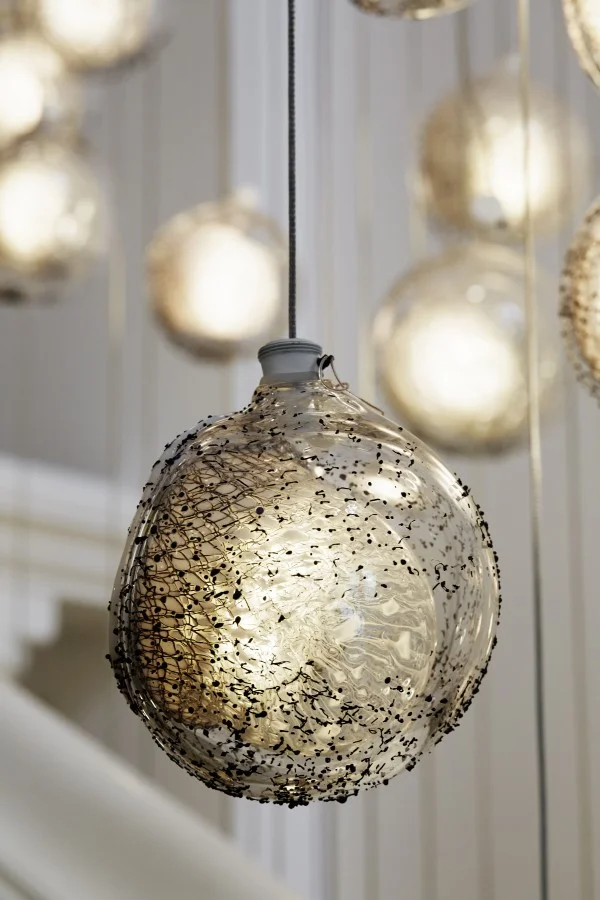Like all projects and products created by Canadian lighting brand Bocci, their vast new showroom in Berlin has been catalogued with a number rather than a title - in this case 79. Bocci '79' is housed in a 2200sqm late 19th century former courthouse in West Berlin. Spread over multiple floors the Kantstrasse showroom captures the majesty of Bocci’s organic shaped creations in glass and metal and allows for the display of custom installations that are too large in scale to be shown outside of public institutions.
Founded by Omer Arbel and his business partner Randal Bishop in 2005 in Vancouver Canada, Bocci has rapidly risen from small atelier to global lighting brand without any compromise to the brand’s artistic integrity. Aubel as the brand’s creative director still signs each piece individually, and while Bocci now has over 40 staff and exhibits at selected trade fairs around the globe, new products are only added to the range when Aubel decides an idea has been developed to its full artistic potential.
Arbel and Bishop decided to open the new showroom in Berlin as their European HQ and ‘living archive’ - a place where they can install works that are too big or too complex to be shown elsewhere. While the pair initially looked to set up the showroom in London it was decided that Berlin offered the more openly artistic environment.
With a 24 metre high central stairwell and some 40 rooms, the courthouse building in Kantstrasse offers plenty of potential for an ever evolving display of prototypes, sculptures and experiments. Currently a new light project called ‘44’ is given pride of place in the grand stair but the idea is that this can and will change regularly to house projects right up to the scale of the one installed in the V&A’s entrance during London Design Festival in September 2013, where 280 individual ‘28’ lights filled a six storey void.
While most will only know of Bocci as a brand that produces exquisite handmade lighting objects - predominantly in glass, Arbel is also the founder of the architecture practice, Omer Arbel Office. He received a Bachelor of Environmental Science before working as an apprentice for the world renown Barcelona architecture studio of Enric Miralles (EMBT). The sudden death of MIralles in 2000 brought Arbel back to Canada where he completed his formal study in architecture and then began working at Patkau Architects in Vancouver. Since 2005 Arbel has worked jointly as the principle of architecture practice OAO and as creative director of Bocci.
All Bocci’s products and projects have been conceived, designed and manufactured in house in their Vancouver headquarters using their own glassblowing/casting, metal casting and porcelain casting facilities along with workshops to create moulds and develop and fit electrical parts. Over the next twelve months the new Berlin building will acquire its own glass and porcelain workshops including all the paraphernalia that is required in the way of furnaces, kilns and artisans.
While other lighting brands work to develop forms, Arbel and by extension Bocci, are most happy allowing an element of accident to drive new creativity. To this end Arbel and his collaborators are constantly experimenting with new processes with the ever-present idea of "what if". Arbel describes this as a "process driven analogue way of finding form".
The brand's most famous light, the '28' was 'designed' through this philosophy, and was the result of many experiments around the concept of withdrawing a small amount of air from a sphere of cooling glass rather than the traditional approach of blowing air in while it remains hot. By adding a small blob of molten glass in another colour at precisely the right time, the air displaced by the newly introduced glass can be drawn out naturally leaving the sphere intact but with a beautiful crater within the sphere.
These types of experiments continue to drive the brand's occasional new releases and not the need to fill any perceived gap in the market or to launch new products for a particular lighting fair. The '73' (below) released in 2015 is a case in point. Here the light is blown into folded layers of a heat proof fabric and allowed to take on the markings texture and seams of the fabric while distorting the form into an irregular ovoid shape.
Interestingly the new showroom on Kantstrasse has had very little in the way of architectural intervention from Arbel and his team. Apart from some basic repairs and cleaning which were necessary due to the building standing unused for more than 10 years, Arbel has added a painted taupe or biscuit coloured band that runs through the building - usually at skirting board height but sometimes spilling down stair banisters or creeping up the walls like a high-tide mark or flood stain. The majestic spaces, classic arches and columns are expressed in clean white paint and this in turn allows the Bocci lights and objects to emphasise space. To Arbel the lights help define the volumes of the spaces they occupy.
Eventually, Arbel hopes to split his time between Berlin and Vancouver with the ultimate goal of the Berlin space becoming a venue not only for showing finished pieces but also to hold workshops and apprenticeships involving the local design schools, of which there are many, including Universität der Künste Berlin and Design Akademie Berlin.
For more information, visit Bocci's website here.
The Bocci showroom Berlin is open Tuesday-Saturday 11-7pm and is situated on Kantstrasse 79, 10627 Berlin.
Bocci is available in Australia through Hub Furniture Lighting and Living.
















